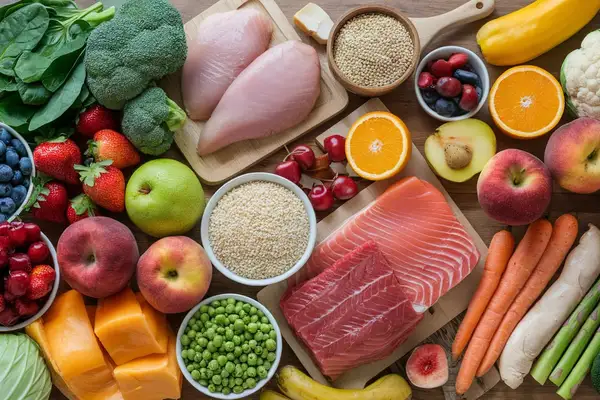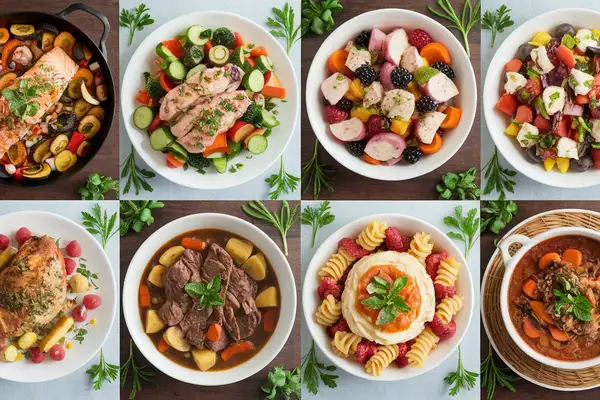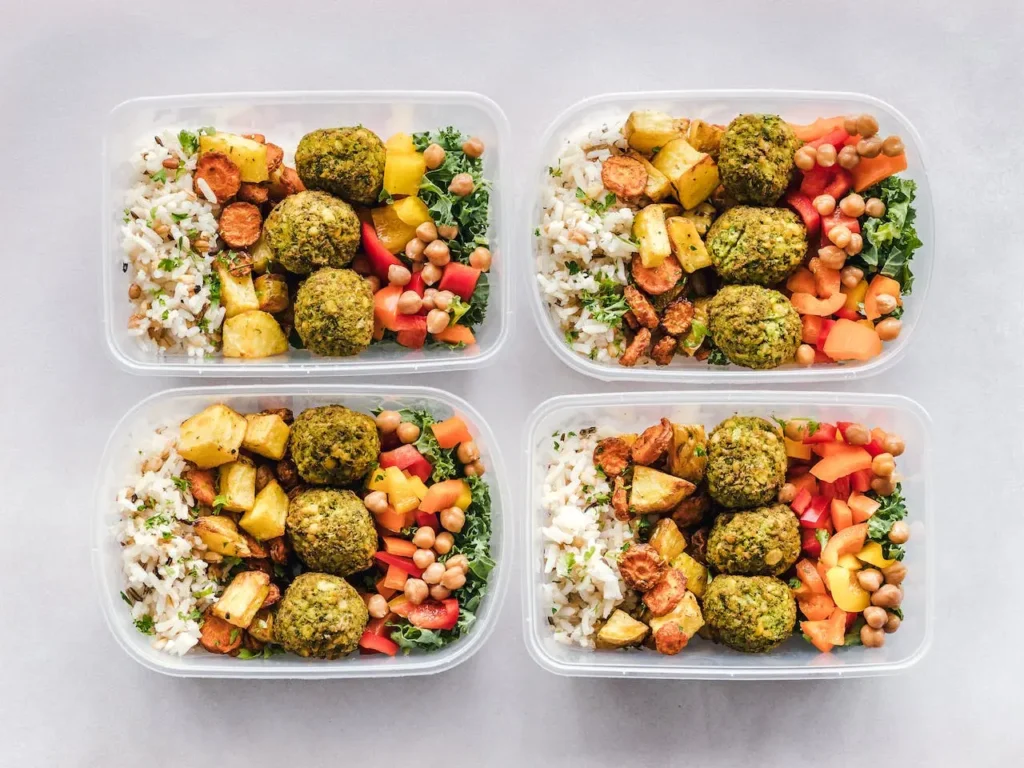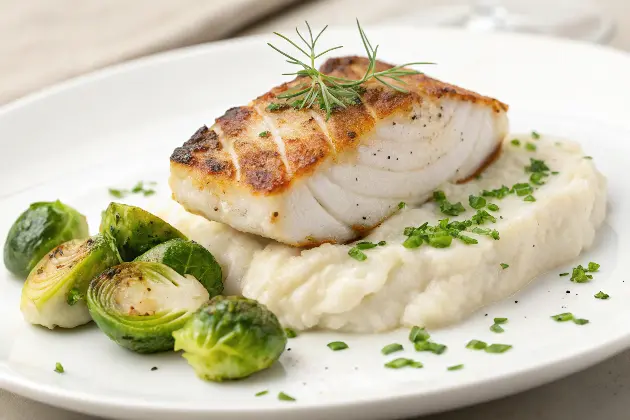7 Day Meal Plan for Kidney Disease: Foods To Eat and Avoid
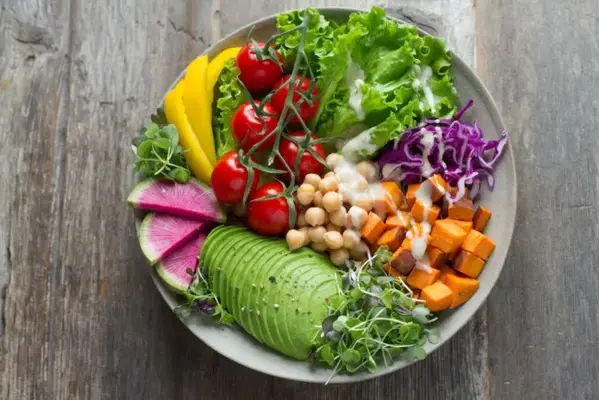
This post may contain affiliate links, meaning I may earn a commission if you make a purchase, at no extra cost to you. I only recommend products I trust. Thank you for your support.
Kidney disease, also known as renal disease, occurs when the kidneys are damaged and cannot filter waste products and excess fluids from the blood effectively.
Healthy kidneys balance electrolytes, remove waste products and excess fluid, and help regulate blood pressure.
When kidney function declines, wastes (like urea and creatinine) and electrolytes (sodium, potassium, phosphorus) can build up in the blood, leading to symptoms such as fluid retention, high blood pressure, muscle weakness, bone disease, and more.
A kidney‑friendly diet is designed to support and preserve kidney function by managing the intake of key nutrients that your kidneys struggle to filter when they’re damaged or under stress.
A kidney friendly diet is most often recommended for people with chronic kidney disease (CKD) or acute kidney injury, but can also help anyone looking to reduce kidney workload and maintain overall kidney health.
In this article, we delve into the benefits of following a 7 day meal plan for kidney disease also known as a 7 day menu for renal diet, and provide renal diet breakfast lunch dinner ideas for each day of the week.
7 Day Meal Plan for Kidney Disease (Kidney Menu)
This carefully curated 7 day meal plan for kidney disease typically includes foods that are low in sodium, potassium, and phosphorus, as these minerals need to be limited to manage the condition.
This kidney friendly diet includes foods that are good for kidney health that are low in sodium, phosphorus, and potassium such as lean proteins, a variety of fruits and vegetables, and limits foods that cause kidney stones.
Here is a detailed 7 day meal plan for kidney disease:
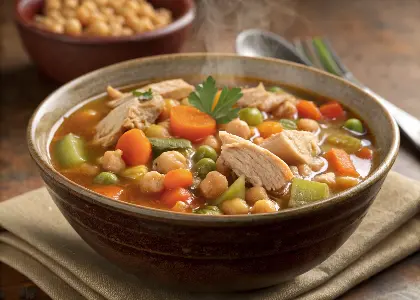
Day 1
Breakfast:
- Blueberry Smoothie: Blend 1 cup of frozen blueberries, 1 banana, 1 cup of almond milk, and a tablespoon of honey
Lunch:
- Slow-Cooker Chicken Chickpea Soup: A hearty and flavorful soup made with chicken, chickpeas, and a variety of vegetables. (4 oz chicken breast, 1 cup chickpeas, 1 cup diced tomatoes, ½ cup carrots, 1 small onion, 1 garlic clove, 4 cups of low sodium chicken broth, 1 tsp cumin, 1 tsp paprika)
Dinner:
- Baked Salmon with Steamed Broccoli: Flaky salmon filet baked to perfection with a side of steamed broccoli. (4 oz salmon, 1 cup steamed broccoli, lemon wedge optional)
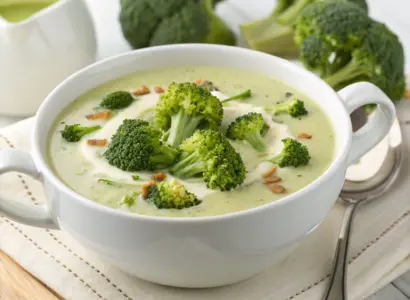
Day 2
Breakfast:
- Cranberry Juice: Enjoy a glass of tart and refreshing unsweetened cranberry juice. (1 cup unsweetened cranberry juice)
Lunch:
- Turkey Wrap: Whole wheat wrap filled with lean turkey slices, lettuce, tomato, and mustard. (1 whole wheat wrap, 4 oz turkey breast, ½ cup lettuce, ¼ cup tomato, 1 tbsp mustard)
- Broccoli and Macadamia Cream Soup: Blend steamed broccoli with soaked cashews, garlic, and vegetable broth for a creamy, dairy-free soup. (1½ cups steamed broccoli, ¼ cup soaked macadamia nuts, 1 clove garlic, 1 cup of low sodium vegetable broth)
Dinner:
- Mediterranean Salad Bowl: Mixed greens topped with olives, goat cheese, cherry tomatoes, cucumbers, and a light dressing. (2 cups mixed greens, ¼ cup goat cheese, ¼ cup olives, ½ cup cucumber, ¼ cup tomatoes, 1 tbsp dressing)
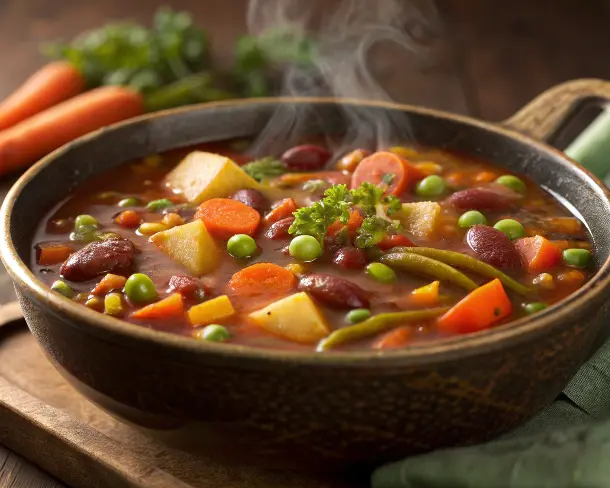
Day 3
Breakfast:
- Carrot Juice: A naturally sweet and nutrient-packed drink made from fresh carrots. (1 cup freshly pressed carrot juice)
Lunch:
- Minestrone Soup: Italian-style vegetable soup with beans, pasta, and tomato broth. (1 cup of low sodium vegetable broth, ½ cup mixed vegetables, ¼ cup beans, ¼ cup pasta)
Dinner:
- Vegetable and Bean Stew: Simmer mixed vegetables and beans in a savory tomato-based broth for a hearty, fiber-rich meal. (1 cup mixed vegetables, ½ cup fresh cooked beans, 1 cup tomato broth, herbs and spices to taste)
- Quinoa Pilaf: Fluffy quinoa cooked with sautéed vegetables and herbs. (1 cup cooked quinoa, ½ cup mixed vegetables, 1 tbsp olive oil, herbs to taste)
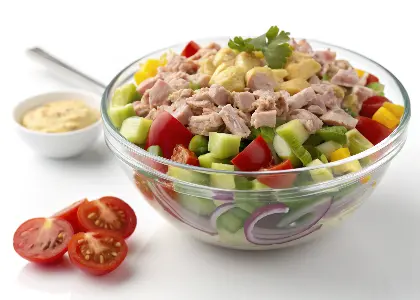
Day 4
Breakfast:
- Beet Juice: Energizing juice made from raw beets, rich in antioxidants and nitrates. (1 cup freshly pressed beet juice)
Lunch:
- Tuna Salad: Mix canned tuna with chopped celery, red onions, and a light olive oil dressing, served on a bed of lettuce. (1 can tuna, ½ cup chopped celery, ¼ cup red onion, 2 cups lettuce, 1 tbsp olive oil)
- Tomato Basil Soup: Smooth soup made with ripe tomatoes, fresh basil, and a touch of garlic. (1 cup diced tomatoes, ½ cup of low sodium vegetable broth, 1 tbsp chopped basil, 1 clove garlic)
Dinner:
- Baked Salmon with Sautéed Kale: Oven-baked salmon filet served with garlic sautéed kale. (4 oz salmon, 1 cup kale, 1 tbsp olive oil, 1 clove garlic)
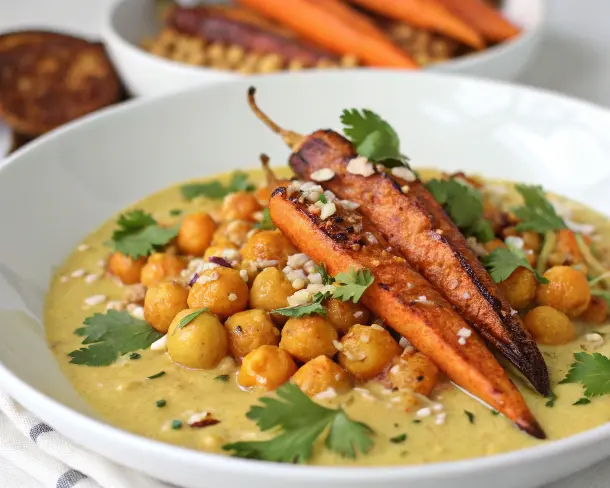
Day 5
Breakfast:
- Chia Pudding: Creamy pudding made with chia seeds soaked in almond milk and topped with berries. (3 tbsp chia seeds, 1 cup almond milk, ¼ cup mixed berries)
Lunch:
- Coconut Curry Chickpeas: Creamy chickpea curry made with light coconut milk, warm spices, and low-potassium vegetables. (1 cup chickpeas, rinsed well, ½ cup light coconut milk, ¼ cup chopped red bell pepper, ¼ cup chopped green beans, 1 tbsp chopped onion, 1 clove garlic minced, ½ tsp turmeric, ½ tsp cumin, 1 tbsp olive oil)
Dinner:
- Grilled Chicken Kabobs: Tender chicken pieces skewered with zucchini, onion, and peppers. (4 oz chicken breast, ½ cup mixed vegetables, 1 tbsp olive oil)
- Strawberry Caprese Salad: Fresh strawberries, cherry tomatoes, basil, and mozzarella drizzled with balsamic glaze. (½ cup strawberries, ½ cup cherry tomatoes, ¼ cup mozzarella, 1 tbsp balsamic glaze)
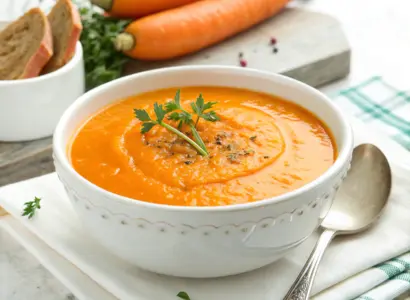
Day 6
Breakfast:
- Shiitake Mushroom Soup: Earthy soup made with shiitake mushrooms, garlic, and vegetable broth. (1 cup vegetable broth, ½ cup shiitake mushrooms, 1 clove garlic)
Lunch:
- Carrot Soup: A smooth and creamy carrot soup made with fresh carrots and seasoned with a blend of herbs and spices. (2 cups carrots, 1 small onion, 2 cups of low sodium vegetable broth, 1 tsp ginger, ½ tsp cumin, 1 tbsp olive oil, salt and pepper to taste)
Dinner:
- Veggie Wrap: Whole wheat wrap filled with hummus, spinach, shredded carrots, and bell peppers. (1 whole wheat wrap, 2 tbsp hummus, ½ cup spinach, ¼ cup carrots, ¼ cup bell peppers)
- Gazpacho: Cold tomato-based soup blended with cucumbers, bell peppers, and onions. (1 cup diced tomatoes, ½ cup cucumber, ¼ cup bell peppers, ¼ cup onion)
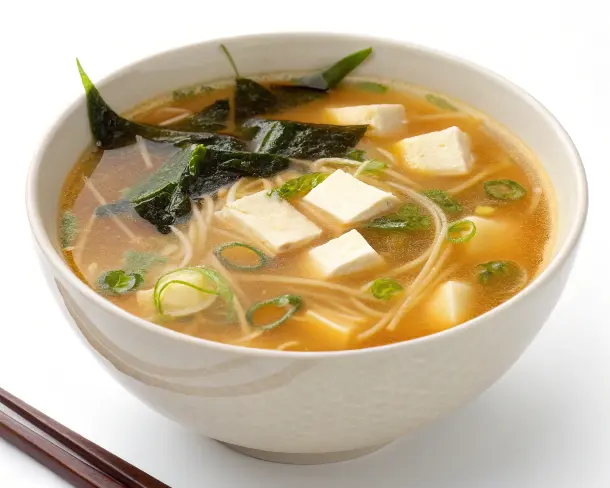
Day 7
Breakfast:
- Turmeric Tea: A warm, soothing tea made with turmeric, ginger, and honey, known for its anti-inflammatory benefits. (1 cup hot water, 1 tsp turmeric powder, ½ tsp ginger powder, 1 tsp honey)
Lunch:
- Quinoa Salad with Chickpeas: Protein-rich salad with cooked quinoa, chickpeas, cucumbers, and lemon vinaigrette. (1 cup cooked quinoa, ½ cup chickpeas, ½ cup cucumber, 1 tbsp lemon vinaigrette)
- Grilled Vegetable Skewers: Skewers with zucchini, bell peppers, cherry tomatoes, and red onion brushed with olive oil. (1 cup mixed vegetables, 1 tbsp olive oil, herbs to taste)
Dinner:
- Miso Soup with Tofu and Brown Seaweed: Light broth with cubes of tofu and rehydrated brown seaweed in savory miso base. (1 cup miso broth, ½ cup tofu cubes, 2 tbsp brown seaweed)
- Mashed Cauliflower: Creamy and low-carb alternative to mashed potatoes, seasoned with garlic and olive oil. (1 cup cauliflower florets, 1 tbsp olive oil, 1 clove garlic)
What Foods Help Repair Kidneys
Supporting kidney health through diet is crucial, especially if you are looking to repair and maintain kidney function.
While no single food can “repair” kidneys, certain foods can help support kidney health and function.
Here are some superfoods good for kidney health that you should consider including in a 7 day menu for renal diet:
1. Beverages
- Water: Staying well-hydrated is essential for kidney function. Water helps flush toxins and prevent kidney stones.
2. Fruits
- Berries: Acai berries, blueberries, strawberries, and raspberries are rich in antioxidants and vitamins that help reduce inflammation and protect kidney cells.
- Red Grapes: Contain resveratrol, which can have anti-inflammatory and kidney-protective benefits.
- Apples: High in fiber and anti-inflammatory compounds that support overall kidney health.
- Cherries: Low in phosphorus and rich in antioxidants.
- Peaches: A good option for a low-phosphorus fruit.
- Pineapple: Low in phosphorus, sodium, and potassium.
3. Vegetables
- Cabbage: Low in potassium and packed with vitamins and fiber, which are beneficial for kidneys.
- Cauliflower: A good source of vitamin C, folate, and fiber, all of which support kidney health.
- Bell Peppers: Low in potassium and rich in vitamins A and C, which help support kidney function.
- Cucumber: Contains minimal phosphorus and is hydrating.
- Lettuce: A low-phosphorus leafy green.
- Zucchini: Another low-phosphorus vegetable suitable for various dishes.
4. Whole Grains
- Barley: Contains magnesium and B vitamins that help improve kidney function.
- Bulgur: A low-potassium, high-fiber grain that can be a kidney-friendly alternative to other whole grains.
5. Lean Proteins
- Fish: Rich in omega-3 fatty acids, which can help reduce inflammation and support kidney health. Examples include salmon, mackerel, and sardines.
- Skinless Chicken Breast: Skinless chicken breast is lower in phosphorus and fat compared to dark meat and skin-on options.
- Egg Whites: Provide high-quality protein without the phosphorus found in egg yolks.
6. Healthy Fats
- Olive Oil: A healthy source of fat that is low in phosphorus and has anti-inflammatory properties.
- Flaxseed Oil: Contains omega-3 fatty acids that can help reduce inflammation.
7. Legumes (in moderation)
- Chickpeas: Provide plant-based protein and fiber but should be consumed in moderation due to their potassium content.
8. Herbs and Spices
- Garlic: Helps reduce inflammation and can replace salt for seasoning, helping manage blood pressure.
- Turmeric: Contains curcumin, which has anti-inflammatory properties and may help protect kidney function.
9. Low-Potassium Foods
- White Bread: Lower in potassium compared to whole grain bread.
- Rice: White rice is a lower-potassium option that can be included in a kidney-friendly diet.
10. Nuts and Seeds (in moderation)
- Pumpkin Seeds: Contain antioxidants and beneficial fatty acids but should be consumed in moderation due to their potassium content.
11. Supplements
- Probiotics: Certain probiotics can help reduce the burden on the kidneys by breaking down waste products.
- Vitamin D: Supports overall health and can help with calcium balance, important for kidney function.
Foods That Cause Kidney Stones
When creating a 7 day menu for renal diet or kidney disease, it’s crucial to avoid foods that can exacerbate the condition or put additional strain on the kidneys.
Certain foods can contribute to the formation of kidney stones by increasing the levels of specific substances in the urine.
Here are some common foods that can cause kidney stones, based on their content of oxalates, calcium, purines, and sodium that you should avoid in a 7-day meal plan for kidney disease:
1. High Oxalate Foods
Oxalates can bind with calcium in the urine to form calcium oxalate stones, the most common type of kidney stone.
These are some of the high oxalate foods to avoid while preparing your 7 day meal plan for kidney disease:
- Spinach: High in oxalates, it can increase the risk of kidney stones.
- Rhubarb: Another vegetable with high oxalate content.
- Beets: High in oxalates and should be consumed in moderation.
- Nuts and Seeds: Especially almonds, cashews, and peanuts.
- Chocolate: Contains oxalates, so it should be consumed in limited amounts.
- Sweet Potatoes: Another high-oxalate food.
2. High-Calcium Foods
While calcium is essential for bone health, excessive calcium intake can contribute to stone formation in some individuals.
Here are some of the high-calcium foods to avoid in your 7 day menu for renal diet:
- Dairy Products: Milk, certain cheeses, and yogurt can be problematic for those prone to calcium stones.
- Calcium-Fortified Foods: Some cereals and non-dairy milks.
3. High-Purine Foods
Purines break down into uric acid, which can lead to uric acid stones and they should not be included in the 7-day meal plan for kidney disease.
- Red Meat: Beef, pork, and lamb are high in purines.
- Organ Meats: Liver, kidney, and other organ meats are particularly high in purines.
- Seafood: Especially shellfish like shrimp, lobster, and scallops, and certain fish like sardines and anchovies.
4. High-Sodium Foods
Excessive sodium can increase calcium in the urine, contributing to stone formation.
- Processed Foods: Such as canned soups, processed meats, and frozen meals.
- Salty Snacks: Chips, pretzels, and salted nuts.
- Fast Food: Often very high in sodium content.
- Sauces and Condiments: Soy sauce, barbecue sauce, and salad dressings.
5. High-Potassium Foods
High-potassium foods can be a concern for individuals with kidney disease or those at risk of hyperkalemia (high potassium levels in the blood).
Below are examples of high potassium foods that should be avoided in a 7 day meal plan for kidney disease:
- Bananas: One of the highest potassium-containing fruits.
- Oranges and Orange Juice: High in potassium and can quickly raise levels.
- Melons: Cantaloupe and honeydew are particularly high.
- Avocados: Packed with potassium.
- Dried Fruits: Raisins, prunes, and apricots have high potassium levels.
- Kiwifruit: Contains a significant amount of potassium.
- Potatoes: Especially baked potatoes with skin.
- Tomatoes: Including tomato sauce and paste.
- Spinach: High in potassium, especially when cooked.
- Sweet Potatoes: Another high-potassium vegetable.
- Beets: Contains a substantial amount of potassium.
- Winter Squash: Varieties like acorn and butternut squash.
6. High-Sugar Foods and Drinks
Sugary foods and drinks can increase the risk of certain types of kidney stones.
- Sugary Beverages: Soda and sweetened juices.
- Candy and Sweets: High-sugar content can be problematic.
- Fructose: Found in many processed foods and sweetened drinks.
7. Other Considerations
- Excessive Vitamin C: High doses of vitamin C supplements can increase oxalate levels.
- Alcohol: Excessive alcohol can increase uric acid levels, potentially leading to stones.
Benefits of a 7 Day Meal Plan for Kidney Disease
A 7 day menu for renal diet is specifically designed to reduce the workload on the kidneys, helping to slow down the progression of kidney disease and manage its symptoms.
Following a 7 day menu for renal diet provides several benefits for individuals with kidney disease:
- Reduces the risk of complications: A well-planned 7 day meal plan for kidney disease can help manage blood pressure, control blood sugar levels, and maintain a healthy weight, reducing the risk of complications such as heart disease and diabetes.
- Manages fluid balance: Kidney disease often leads to fluid retention. By following a 7-day meal plan for kidney disease, individuals can control their fluid intake, which helps prevent swelling and edema.
- Maintains electrolyte balance: Kidney disease can disrupt the balance of electrolytes in the body. A 7 day menu for renal diet helps regulate the intake of sodium, potassium, and phosphorus, ensuring they stay within healthy limits.
- Supports overall health: A 7-day meal plan for kidney disease provides essential nutrients, vitamins, and minerals for overall health, promoting well-being despite kidney disease.
Lifestyle Changes To Complement the 7 Day Meal Plan for Kidney Disease
By incorporating these lifestyle changes alongside the 7 day meal plan for kidney disease, individuals can take a holistic approach to kidney health management.
Here are some additional lifestyle changes that can complement the 7 day meal plan for kidney disease and promote overall kidney health:
- Limit Processed Foods: Reduce consumption of processed and packaged foods that are often high in sodium, phosphorus additives, and unhealthy fats.
- Mindful Eating: Pay attention to portion sizes and avoid overeating. Eating slowly and savoring each bite can help prevent over-consumption.
- Cook at Home: Cook meals from scratch using fresh, whole ingredients to have better control over the quality and nutritional content of your food.
- Reduce Sugar Intake: Minimize consumption of sugary beverages, desserts, and snacks, as excessive sugar intake can contribute to diabetes and kidney damage.
- Monitor Phosphorus and Potassium: Be vigilant about reading food labels to identify hidden sources of phosphorus and potassium in packaged foods.
- Stay Active: Engage in regular physical activity as recommended by your healthcare provider. Exercise can help improve blood flow, maintain healthy weight, and boost overall well-being.
- Manage Stress: Incorporate stress-management techniques such as deep breathing, meditation, yoga, or tai chi to reduce stress levels, which can positively impact kidney health.
- Get Sufficient Sleep: Aim for 7-8 hours of quality sleep each night to support overall health and well-being, including kidney function.
- Maintain Healthy Blood Pressure: Keep track of your blood pressure and take steps to maintain it within a healthy range. This may include medication, lifestyle changes, and stress management.
- Quit Smoking and Limit Alcohol: If you smoke, consider quitting as smoking can damage blood vessels and worsen kidney function. Limit alcohol intake to moderate levels as excessive alcohol consumption can impact blood pressure and kidney health.
- Stay Hydrated: Maintain proper hydration by drinking sufficient water throughout the day. Adequate hydration supports kidney function and helps prevent kidney stones.
Resources
To further support you on your renal diet journey, here are some resources that provide valuable information about 7 day meal plan for kidney disease or kidney diet:
- National Kidney Foundation – Visit their website at www.kidney.org for comprehensive information on kidney disease, renal diet guidelines, and additional resources.
- American Association of Kidney Patients – Access their website at www.aakp.org for educational materials, support groups, and advocacy initiatives.
- DaVita Kidney Care – Explore their website at www.davita.com for renal diet recipes, educational articles, and online support communities.
- Renal Support Network – Visit their website at www.rsnhope.org for resources, educational webinars, and patient support programs.
- Kidney Kitchen – Access their website at www.kitchen.kidneyfund.org for a collection of kidney-friendly recipes and cooking tips.
Conclusion
A well-planned 7 day meal plan for kidney disease can play a crucial role in supporting kidney health and overall well-being.
By focusing on low-phosphorus, low-sodium, and low-potassium foods, individuals with kidney disease can manage their condition effectively and reduce the risk of complications.
The 7 day menu for renal diet includes a variety of nutrient-dense foods such as lean proteins like chicken, fish, and shrimp, along with plenty of fruits, vegetables, whole grains, and healthy fats.
Portion control, hydration, and mindful choices regarding seasoning and preparation methods are emphasized to ensure optimal kidney function.
Remember to consult with a healthcare provider or registered dietitian for personalized recommendations based on your specific needs and stage of kidney disease.
With proper nutrition and lifestyle management, individuals with kidney disease can enhance their quality of life and support long-term kidney function.
- 7-day meal plan for seniors
- 7-day meal plan for gastritis
- 7-day PCOS diet plan
- 5-day menopause diet plan to lose weight
- 90-30-50 diet plan
- Antioxidant diet plan for inflammation
- 7-day bone broth diet plan
- 7-day meal plan for pancreatitis
- Find the best arthritis pain relief solution
- Small Fiber neuropathy: Symptoms, causes, and treatment
- Time saving and easy meal prep ideas
- Diabetic meal plan
- Comfort care or palliative care
- Fatty liver diet plan
- How to get rid of PCOS belly fat
- Easy meal ideas for summer
- What foods to eat when taking trulicity
Frequently Asked Questions (FAQs)
Can I modify the meal plan to suit my tastes and preferences?
Absolutely! The 7-day meal plan for kidney disease provided meal plan serves as a starting point and can be modified based on your personal preferences and dietary needs.
Is it necessary to count calories on a renal diet?
Calorie counting may be necessary for individuals with specific weight management goals or conditions such as diabetes.
However, for most individuals with kidney disease, focusing on the quality and composition of meals is more important than strict calorie counting.
Can I eat out while following a 7 day menu for renal diet?
Calorie counting may be necessary for individuals with specific weight management goals or conditions such as diabetes.
However, for most individuals with kidney disease, focusing on the quality and composition of meals is more important than strict calorie counting.
Monitor portion sizes and consult with a healthcare provider or dietitian for personalized guidance.
Can I incorporate snacks into the 7 day meal plan for kidney disease?
Snacks can be incorporated into the 7 day meal plan for kidney disease based on your individual needs and dietary restrictions.
Opt for kidney-friendly snacks such as unsalted nuts, low-potassium fruits, and homemade vegetable sticks with a kidney-friendly dip.
How can I make sure I’m getting enough protein on a renal diet?
Include lean sources of protein like chicken, turkey, fish, and legumes in your meals. You can also incorporate protein-rich snacks like Greek yogurt or low-sodium cottage cheese.
What are the key nutrients to consider in a 7 day meal plan for kidney disease?
A 7 day meal plan for kidney disease should provide the right amount of protein, fat, and carbohydrates.
A balanced intake of these nutrients helps the body maintain energy levels, support muscle health, and promote overall well-being.
What are some tips for managing phosphorus and potassium levels in a 7-day meal plan for kidney disease and diabetes?
In a 7-day meal plan for kidney disease and diabetes, it’s important to manage phosphorus and potassium levels to support kidney health.
This may involve choosing foods lower in phosphorus, such as fresh fruits and vegetables, and being mindful of potassium-rich foods like bananas and potatoes.
Disclaimer: This 7 day meal plan for kidney disease is intended for informational purposes only and is not a substitute for professional medical advice, diagnosis, or treatment.
Before making any significant changes to your diet, it is crucial to consult with a qualified healthcare provider, such as a nephrologist or registered dietitian.
They can assess your specific health condition, kidney function, nutritional needs, and any existing medical concerns to create a personalized meal plan for kidney disease tailored to your requirements.
